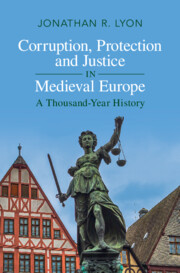Book contents
- Corruption, Protection and Justice in Medieval Europe
- Corruption, Protection and Justice in Medieval Europe
- Copyright page
- Dedication
- Contents
- Maps and Figures
- Acknowledgments
- Abbreviations
- Additional material
- Introduction
- 1 The First “Medieval” Advocates
- 2 Putting Down Roots in Ninth-Century Francia
- 3 The “Aristocratization” of Post-Carolingian Advocacy
- 4 Elite Competition at the Turn of the First Millennium
- 5 The Limits of Church Reform
- 6 Pigs and Sheep, Beer and Wine, Pennies and Pounds
- 7 A History of Violence
- 8 Weapons of the Not-So-Weak
- 9 The Murder of Archbishop Engelbert
- 10 Widening the Lens
- 11 The Emperor as Vogt, ca. 1000–1500
- 12 From Lordship to Government?
- 13 Reframing the History of Violence
- 14 Crossing the False Divide
- 15 A Cultural History of the Rapacious Advocate, or: William Tell’s Revenge
- Conclusion
- Works Cited
- Index
15 - A Cultural History of the Rapacious Advocate, or: William Tell’s Revenge
Published online by Cambridge University Press: 12 October 2022
- Corruption, Protection and Justice in Medieval Europe
- Corruption, Protection and Justice in Medieval Europe
- Copyright page
- Dedication
- Contents
- Maps and Figures
- Acknowledgments
- Abbreviations
- Additional material
- Introduction
- 1 The First “Medieval” Advocates
- 2 Putting Down Roots in Ninth-Century Francia
- 3 The “Aristocratization” of Post-Carolingian Advocacy
- 4 Elite Competition at the Turn of the First Millennium
- 5 The Limits of Church Reform
- 6 Pigs and Sheep, Beer and Wine, Pennies and Pounds
- 7 A History of Violence
- 8 Weapons of the Not-So-Weak
- 9 The Murder of Archbishop Engelbert
- 10 Widening the Lens
- 11 The Emperor as Vogt, ca. 1000–1500
- 12 From Lordship to Government?
- 13 Reframing the History of Violence
- 14 Crossing the False Divide
- 15 A Cultural History of the Rapacious Advocate, or: William Tell’s Revenge
- Conclusion
- Works Cited
- Index
Summary
This chapter provides a cultural history of the wicked advocate from the tenth to the nineteenth centuries in order to argue that advocates’ corrupt practices of justice and protection reflect deep-rooted problems in the history of local administration. It starts with monasteries’ miracle stories about advocates suffering in death as punishment for their crimes in this life. It then turns to the Swiss legend of William Tell and analyzes the earliest versions of the legend in order to demonstrate that Tell’s rival, the wicked advocate Gessler, abused his position in ways similar to those of other advocates. This chapter then discusses Friedrich Schiller’s play Wilhelm Tell to show that concerns about corrupt practices of justice and protection extended into the early nineteenth century. Local legends about bad advocates, some of them preserved today on the Internet, provide additional evidence for the enduring value of stories about wicked advocates who are punished for their bad deeds.
- Type
- Chapter
- Information
- Corruption, Protection and Justice in Medieval EuropeA Thousand-Year History, pp. 325 - 345Publisher: Cambridge University PressPrint publication year: 2022

